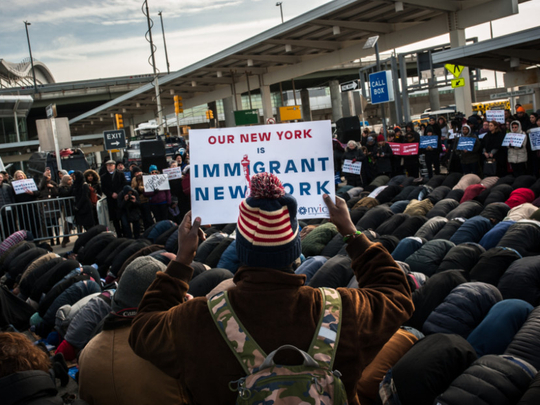
Millions of people around the world have been disturbed or directly affected by an executive ban issued by United States President Donald Trump week before last. It bans the entry of nationals from seven Muslim-majority countries for a period of three months with immediate effect. The affected countries are Iran, Iraq, Libya, Somalia, Sudan, Syria and Yemen. Nationals from these countries, even if they hold other nationalities, will be subject to the ban.
The ban also suspends the refugee admissions programme for a period of 120 days from the signing of the order. Also included is an indefinite suspension of all Syrian refugees coming to the US seeking asylum. Trump also reduced the total number of refugees acceptable from any country from the previously proposed 115,000 down to 50,000.
Suffice to say, the speed with which the ban was implemented caught most people by surprise. Even US authorities directly involved in enforcing the ban were unprepared, adding to the massive confusion among travellers worldwide.
There were howls of protests from all quarters, including from distinguished politicians, media personalities as well as human rights groups. Many people openly questioned why only these seven countries were chosen for the ban — countries that seemed to have had nothing to do with the September 11, 2001, attack on America.
So how did the Saudis react to the news of the ban?
Most of those I met were still in a state of confusion, unsure whether this ban was the first in a series of many. Hussain, a political analyst, felt that Mr Trump had gone too far: “He has just assumed the office of the Presidency and immediately he goes about with divisive orders. It seems he had not properly studied the consequences because the worldwide reaction to the ban is obviously a clear indication of displeasure at his actions. Was there any sensible thought process that went behind the scenes before announcing the ban? It seems not, and those are not comforting signs from an individual who holds the most powerful seat in the world.”
Muna, a businesswoman, feels that this is an attack on religious grounds: “What Trump has done has validated to me the feelings that there are many in the US [political] hierarchy who secretly harbour a war with Islam. These people will feed the frenzy of fear to their followers in order to pursue their evil agendas. This is Islamophobia at its worst and it is disgusting to note how many ... Americans have been [done] in by this con-artist.”
Ahmad, an airline executive and a US green card holder is worried: “I seriously don’t know how far Trump is going to go with this. With my green card, I used to feel protected before. Today, I am not so sure. Even though Saudi Arabia is not on the list, who knows how the guy at the immigration counter checking my passport upon arrival will interpret Trump’s new laws. Will I be forced to relinquish my card? Why this vengeance against Muslims? And would we be next?”
Ali, a factory owner, said: “I have read enough about why Saudis are not being included in the list and frankly I am upset. I resent the implication that as a Saudi I am responsible for the events of September 11. I absolutely reject any such notions and do not have to apologise to anyone on this planet for misdeeds committed by others. Denying me the right to travel to the United States, if such a thing is to happen, is shameful.”
Khalid, a dentist, had this to share: “I studied for my degree in Dentistry in the United States. I have many friends and associates there. I am thankful that my country was not included in the ban, otherwise it would have left me very sad. My son today is studying in a university in Minneapolis and just imagining him not being able to finish his studies would be very disruptive. Hopefully, the US president will soon abolish this ban ...”
Ismail, a university student, added: “Just because we Saudis escaped the ban does not make me any happier. I read of the miseries created and families disrupted by this ban worldwide. Is that supposed to make me pleased? Why are these countries being singled out on the basis of their religion? I can predict that terror groups today are smacking their lips at Trump’s actions, for he has given them a reason and a cause. This does not encourage peace and harmony. Is this the collective will of the people of the United States? I sincerely hope not.”
Granted, Saudis are not included in the ban, but that does not make them necessarily feel any better. There is worry and concern that the lid of Pandora’s Box is slowly opening and this may lead to a clash of civilisations, a clash no one in his or her right minds would hope for.
Tariq A. Al Maeena is a Saudi socio-political commentator. He lives in Jeddah, Saudi Arabia. You can follow him on Twitter at www.twitter.com/@talmaeena












